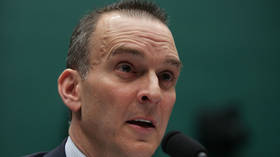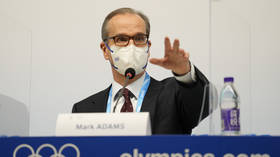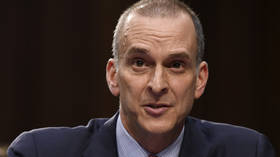USADA comments on new Valieva claims

The head of the US Anti-Doping Agency (USADA) has said unsubstantiated reports of Russian figure skating star Kamila Valieva listing two legal heart drugs on a pre-Winter Olympics anti-doping form suggest "something more serious is going on" in the Beijing Games sensation's high-profile case.
A document filed in Valieva's arbitration hearing over a provisional suspension, which she successfully argued against at a Court of Arbitration for Sport (CAS) hearing on Sunday, showed that Valieva's sample submitted at the Russian national championships on December 25 included three substances that can be used to help the heart, according to the New York Times.
L-carnitine – a performance-enhancer that raises oxygen – and Hypoxen, which increases blood flow to the heart and was the recent subject of a failed banning attempt by USADA, were both declared by Valieva, the report said.
“You use all of that to increase performance,” USADA CEO Travis Tygart told AP, suggesting that the combination of the drugs with trimetazidine, the substance Valieva tested positive for which is on the World Anti-Doping Agency's (WADA) banned list, weakened the 15-year-old's claim that her sample had been accidentally contaminated.
HYPOXEN:Hypoxen is a drug designed to increase oxygen flow to the heart. The U.S. Anti-Doping Agency recently tried, without success, to get it placed on the banned list.
— The Associated Press (@AP) February 16, 2022
L-CARNITINE:L-carnitine, another oxygen-boosting performance enhancer, is banned if injected above certain thresholds.
— The Associated Press (@AP) February 16, 2022
Tygart told the outlet that the reported presence of the substances "totally undermines the credibility" of Valieva's defense and is “an indication that something more serious is going on."
AP said that two people with knowledge of the case had confirmed that WADA filed a brief echoing Tygart's views at the hearing, adding that its sources spoke under anonymity because the paperwork was not publicly available.
WADA has not commented on the reported brief. Valieva has been allowed to continue competing for the Russian Olympic Committee after contesting that the Russian Anti-Doping Agency (RUSADA) was right to lift her provisional suspension for trimetazidine.
L-carnitine is banned when it is injected above certain levels, and the report said that Tygart had been commenting on the potential impact of the legal drugs alongside 2.1 nanograms of trimetazidine, a drug associated with angina treatment.
Valieva’s mother is said to have argued as part of the hearing that regular usage of trimetazidine by the figure skater's grandfather would explain how it entered her system.
Numerous sporting and legal figures have dismissed the notion of trimetazidine having performance-enhancing effects.
The detection of the drug in Valieva's sample only came to light after the favorite in the singles competition at the Games helped Russia to win team gold with a performance that included a first for a female at the Olympics when she landed a quad.
The medal ceremony for the event was subsequently called off while the International Olympic Committee (IOC) began a consultation with the International Skating Union over the legal issue of Valieva's test being returned from a Stockholm lab that is accredited by WADA.
Valieva is deemed a 'protected person' by Wada because of her age, meaning she did not need to be named and could face lesser sanctions if she is found to be at fault.
The timing of the result meant that the Russian and European champion had insufficient time to assemble a proper legal defense, and it is not clear whether she has requested the B sample she is entitled to receive from the laboratory.
The IOC also announced that there will be no medal ceremony for the singles event if Valieva earns a podium position when the competition ends on Thursday.
IOC spokesman Mark Adams reminded the media of the need for "due process" on Wednesday.
“This case has not yet concluded," he said, calling the drawing of premature conclusions "really inappropriate".
"CAS made that very clear. In fact, as far as I know, the B Sample hasn’t even been opened."
Tygart warned earlier in the week that the US could seek prosecution over the issue under a bill that allows legal action to be taken when US athletes are affected by incidents in sporting competitions.
"If Russia had followed the rules, we would know for certain the outcome of the figure skating team event," he said on Monday.
"Those athletes who gave it their all could have their podium moment during these Games as they rightfully deserve, with the world in celebration with them."















